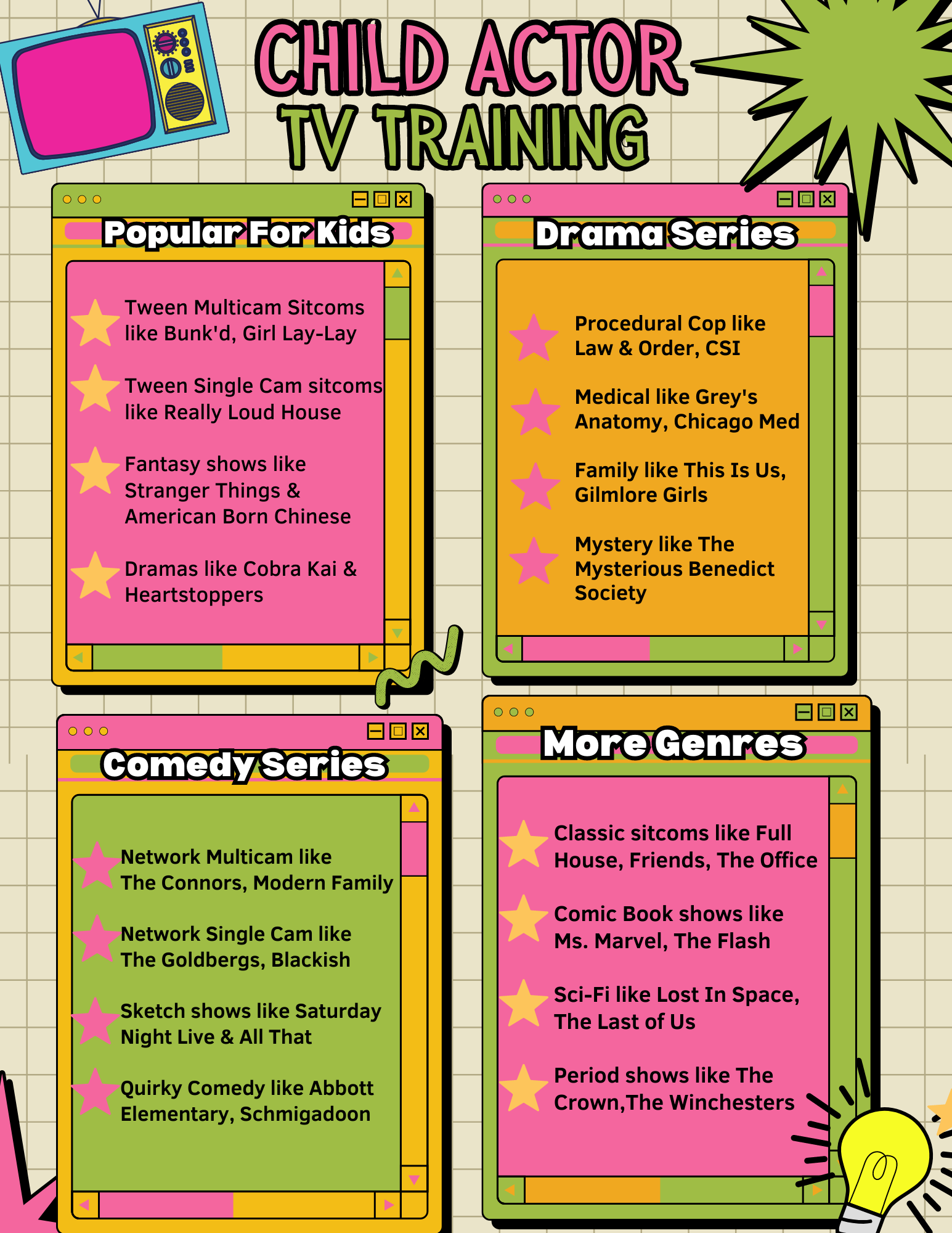The Screen Time That Counts: 8 Reasons Why Child Actors Need to Be Watching TV Shows
In a generation where the screens of TikTok, YouTube, and video games dominate young eyes, the value of watching television may seem to have diminished. The phrase "too much screen time" has become synonymous with the disapproval of a child's excessive engagement with digital devices. However, for child actors, there's a type of screen time that is not only beneficial but crucial for their growth and development in the acting field—watching TV shows.
Let's explore why television, often dismissed as mere entertainment, can be a free training ground for budding child actors.
Better Understanding of the Industry Through Regular TV Consumption
1. Free Training Through Observation:
Television is an accessible treasure trove of performances by accomplished actors. By simply tuning in and paying attention, child actors can glean insights, techniques, and inspiration from professionals. This doesn't mean passively watching; it involves analyzing how emotions are conveyed, how lines are delivered, and how characters are built. The screen becomes a free acting class, taught by some of the best in the business.
2. A Multiverse of Genres:
Television is a kaleidoscope of storytelling, with genres ranging from drama to science fiction, fantasy to crime. Each genre brings a unique tone and style to the acting. Encouraging child actors to explore various genres helps them understand these nuances. They learn to appreciate the difference between the grounded reality of a procedural drama and the whimsical charm of a family sitcom.
3. The Rhythm and Formula of Sitcoms:
Sitcom acting is an art unto itself. The timing, the rhythm, and the connection with a live audience (in some cases) create a unique challenge. Familiarity with these formulas can guide young actors to find ways to make a scene or character resonate. Recognizing common tropes, such as the clumsy sidekick or the wise elder, can guide interpretations and choices.
A class with a laugh track
Sign up for Sitcom Success and learn to land the joke and get the rhythm of the most popular genre of tv shows that currently cast child actors.
4. Preparing for Auditions:
When a child actor receives an audition for a TV show currently on air, watching at least a full episode becomes a vital part of preparation. It helps them grasp the show's tone, style, and the dynamics between regular characters. Such insights can be instrumental in delivering an audition that fits seamlessly into the established world of the show.
5. Learning from the Best:
Knowing the actors who are booking work and watching them perform is a continuous education. It helps young actors identify what makes a performance stand out, what resonates with the audience, and what fits within the industry's current trends. This observational learning cultivates skills and instincts that cannot be taught in a traditional classroom.
6. Shaping the Actor's Perspective:
While watching TV, child actors are encouraged to view it from an actor's perspective. They should assess what the actors are doing in their scenes to succeed. It's about dissecting the performance, understanding the choices made, and reflecting on how they would approach the role.
7. Fueling Motivation and Dreams:
Seeing talented performers on TV, especially those who are their age, can boost child actors' motivation. It's a vivid reminder of what's possible, a tangible representation of their dreams, and a reinforcement of their passion for acting.
8. Researching Casting Directors:
In professional interactions, such as meeting with a casting director, knowing the types of programs they cast provides insight. If you're faced with an unfamiliar title, understanding the casting director's preferences and tendencies can guide your approach to the audition.
HERE is a list I compiled of the best acting performances in film that child actors can learn from and analyze.
The Unlikely Classroom
Parents Make TV Time Productive
For parents of child actors, the TV remote doesn't have to be an enemy. Rather, it can be a tool to facilitate learning, bonding, and growth. Parental support is vital in a child actor's journey. Through guided and engaged TV watching, parents can foster growth, curiosity, and a love for the art. It's about transforming TV time from passive consumption to active learning and appreciation, where every show or clip becomes a stepping stone in the young actor's path to success.
Embrace this shared journey, tune in together, and watch as the world of television opens up new horizons for your aspiring star.
The call to reduce screen time for children has its merits, but for child actors, television offers a unique, unstructured, yet invaluable classroom. It's a multifaceted resource that sharpens understanding, enriches performance, and fuels motivation.
Rather than dissuading child actors from watching TV, parents and mentors should guide this viewing towards educational ends. Emphasizing critical engagement with what's on screen can transform entertainment into education. After all, in the field of acting, sometimes the best teachers are those performing right in your living room.
Here's how parents can turn TV time into a nurturing experience:
1. Encourage Variety:
Prompt your child to explore various TV shows, or even clips from different genres and styles. This not only broadens their understanding but keeps their interest piqued. A detective show one day, a comedy the next—every channel change is a new lesson.
2. Family Viewing Time:
Watching TV as a family can be more than a relaxing pastime; it can be a shared learning experience. Encourage discussions about characters, plot, and performances. Ask your child how they might play a particular role. Their insights might surprise you, and your engagement will surely encourage them.
3. Revisit Auditioned Shows:
If your child has auditioned for a particular show, make a point to watch it together, whether or not they were cast. Analyzing what made it to the screen can provide valuable insights and closure. It's not about focusing on what went wrong but understanding what fits and learning for the future.
4. Guided Watching:
Instead of merely watching, guide your child to observe specific aspects of a performance. Focus on body language one day, voice modulation the next. By targeting different elements, you help them build a more rounded skill set.
5. Celebrate the Art:
Finally, keep the joy of acting alive. Appreciate and celebrate great performances with enthusiasm. Your genuine interest and excitement can fuel their passion for the craft.








